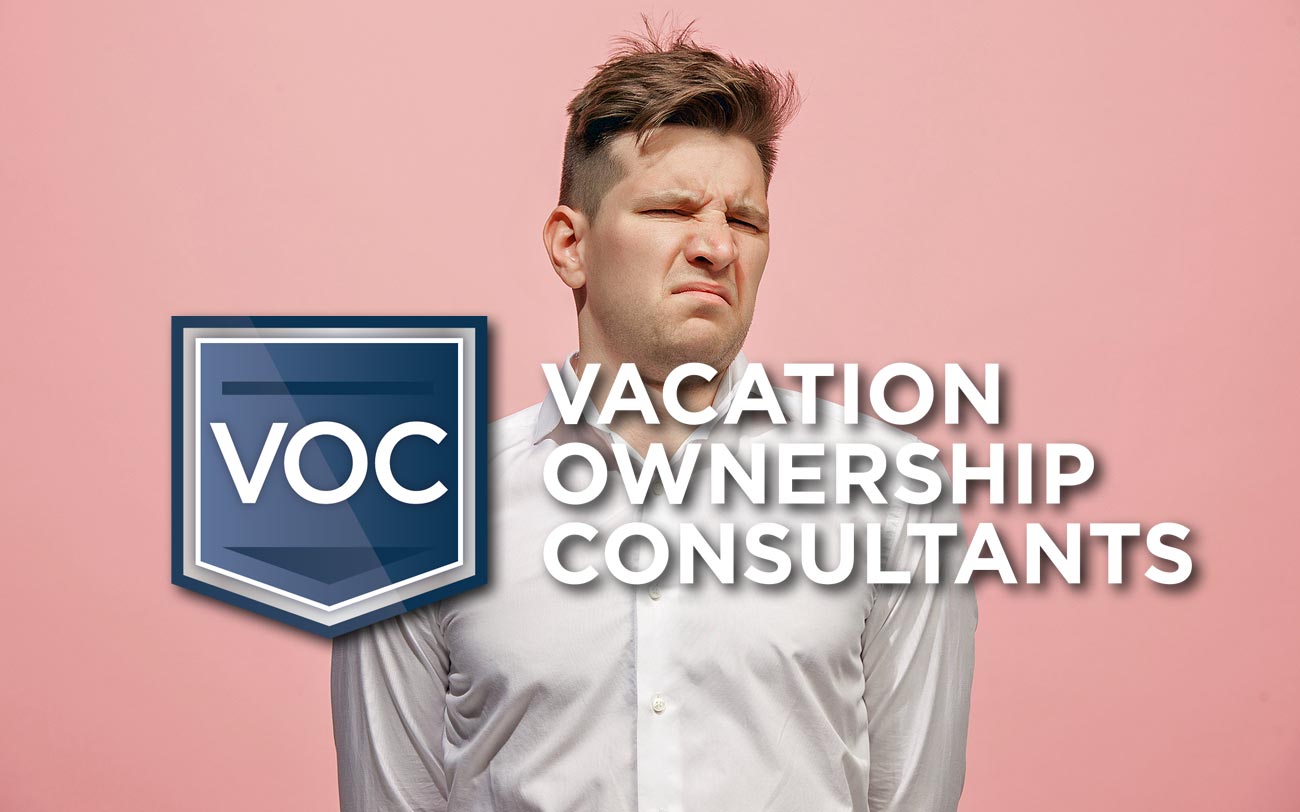When it comes to the purchase of a timeshare, buyers are rarely even in the market for a perpetual travel package. In fact, many are on vacation with relaxed spending habits when the opportunity arises. When they’re caught off guard by an overwhelming amount of hype and free gifts, they can’t help but be intrigued by what’s being presented to them. We call this the sales psychology of timeshares – and it’s horribly effective.
Although a good portion of the timeshare cancellation industry prefers to follow the same set of tactics, we’d rather educate you on the process. You see, at VOC, we pride ourselves in qualifying every vacation owner. Not only does this ensure we don’t over promise our clients, but it allows us to point them in the right direction.
Fact: Escaping a Timeshare is No Easy Feat.
For some, timeshare contracts are not as limiting as they may appear. For others, legally terminating the agreement is their best option. Either way, it’s important that owners don’t work with an exit company that’s only interested in closing rates. Finding someone they can trust to exhaust every option with the resort is key. This type of discernment isn’t exactly available during the timeshare sale.

Every Phase of the Timeshare Sales Cycle:
If you want to make a confident decision with the product, understanding the sales psychology of timeshares will help. When you’re able to see and avoid the nonsense of broken promises and stick to your gut, you’ll make a lot of headway in sales driven marketplaces. So let’s take a look at the sales cycle of timeshares and what we can take away from the psychological approach.
1. First Impressions Are Meant to Groom Consumers.
From start to finish, timeshare companies do an amazing job of grooming or nurturing their ideal target audience. For the most part, this consists of lower to median income families that don’t have much expendable income for travel. Presenting them with a “once in a lifetime” opportunity usually sticks. While most people are initially hesitant to believe these types of offers, the sales psychology of timeshares works like a charm.
The consumer disadvantage begins when they arrive at a timeshare presentation. Getting people to show up is probably the most difficult element of the sale. As prospects walk into the lobby or hotel conference room, they’re often treated as if they’re VIP guests of high stature. In today’s world, this isn’t a commonality. Well, unless there’s some sort of catch.
The Pandering of Consumers is Widely Used in Sales.
Guests that end up feeling like they stumbled across a golden opportunity often receive the warm welcome in stride. In other words, they eat up the compliments and euphoric attention. This is often where salesmen begin to massage them into thinking they deserve to be pampered or need something better in their life to be happy. Once guests feel special and get comfortable, the sales psychology of timeshares devours them.

2. Building a Sense of Trust and Camaraderie.
Every presentation attendee is strategically matched with a sales representative that most mirrors who they are. This could be based on culture, family makeup, career paths or other personal characteristics. Sales teams often huddle together as guests arrive to determine who’s best suited for who. The goal is to be able to relate to prospects and build a sense of relaxed trust.
Once this is achieved, designated sellers begin to ask innocent questions to expand the relationship. The more you share the more the bond grows. As the interview progresses, more personal questions tend to be posed. For some, this creates discomfort. But many trust the salesman enough to share their private details without much clarity as to why. At this point, they’re no longer strangers.
Lifelong Friendships Don’t Exist in Sales Environments.
Potential buyers that don’t see or question the sales psychology of timeshares often believe they’ve made a friend. One that wants to see them (or their family) strike a good deal and enjoy themselves. In reality, salespeople are not your friend. If they close the deal, there’s a big payday in store for them.
It may appear they know you too well or you have a lot in common, but they’re really just good at observation and sales psychology. Knowing everything about your income, hobbies, desires, relationships, experiences or personal issues helps them position the product with appeal. In other words, all that you share is normally used against you.

3. Showing Consumers What They Don’t Have.
When timeshare companies fail to build immediate trust, they often turn to more aggressive measures to put pressure on the decision maker(s). This is where wives are often pitted against their husbands or children against their parents. Things like, “Wouldn’t you like to treat your kids to this amazing vacation every year,” are said to create guilt around walking away.
When timeshare reps get someone in the group on their side, then momentum shifts in their favor. The easiest way for them to do this is by giving tours of master suites and prominent views. Since most consumers have to see something to believe it, tours can be really convincing – even if the rooms shown will never be available to them. Seeing what they don’t have can be a motivating factor to say the least.
At the same time, experiencing something that most people covet can be blinding. Especially when it’s said to be affordable. Once guests are shown picture after picture of happy families in luxurious destinations, some begin to feel as though they need the vacation package. At this point, the sales psychology of timeshares is almost entrancing.

4. Stirring Up Excitement Around “The Deal”.
Aside from the hoopla upon arrival, timeshares do a good job of keeping their guests engaged throughout the sale. Since the product is pitched in a group setting, the presentation usually begins with a podium speaker that throws out offers to see which unsuspecting consumer will bite first. Their job is to pump excitement into the crowd and create an environment like The Price Is Right.
By the time this portion of the sale is complete, someone almost always signs up for an unbelievable package that’s no longer available. The first contract signing does not go unnoticed. Because of this, many attendees begin to think their chances at striking a bargain are narrowing – even if they don’t know why they’re there. The sales psychology of timeshares is that good.
Whether sales reps ring a loud gong, choreograph a standing ovation or pop a bottle of champagne with guests; the celebration messes with the mental state of onlookers. In turn, quite the stir is created while more “today only deals” are dangled. All of the excitement is used to establish a fear of missing out on something important.

Don’t Let Psychological Sales Practices Fool You.
Next week, we’ll close out this list with the final two elements of the timeshare sale. Despite the aforementioned efforts, most sales teams have to continue working hard to get contracts signed. In most cases, they do this by controlling the close and completely wearing people down. Since there are many ways they go about doing so, we wanted to keep this portion separate. We’ll also share some tips to help you overcome tempting offers that come your way.
At the end of the day, timeshares are a complicated product. Making a decision to purchase one in a few hours is never a good idea. No matter how good or cheap the product appears, there’s almost always a catch. Learning how to understand timeshare contracts before attending sales pitches is a good common practice.
Nonetheless, if you or someone you know has fallen for the sales psychology of timeshares, there’s still hope. While there are a multitude of scams to be leery of, not every organization is out to get you. At VOC, we’ve put a lot of time and effort into our reputation. Not only do we take pride in an ethical process, but an effective one. We hope you’re able to feel our genuine sincerity through our content.






